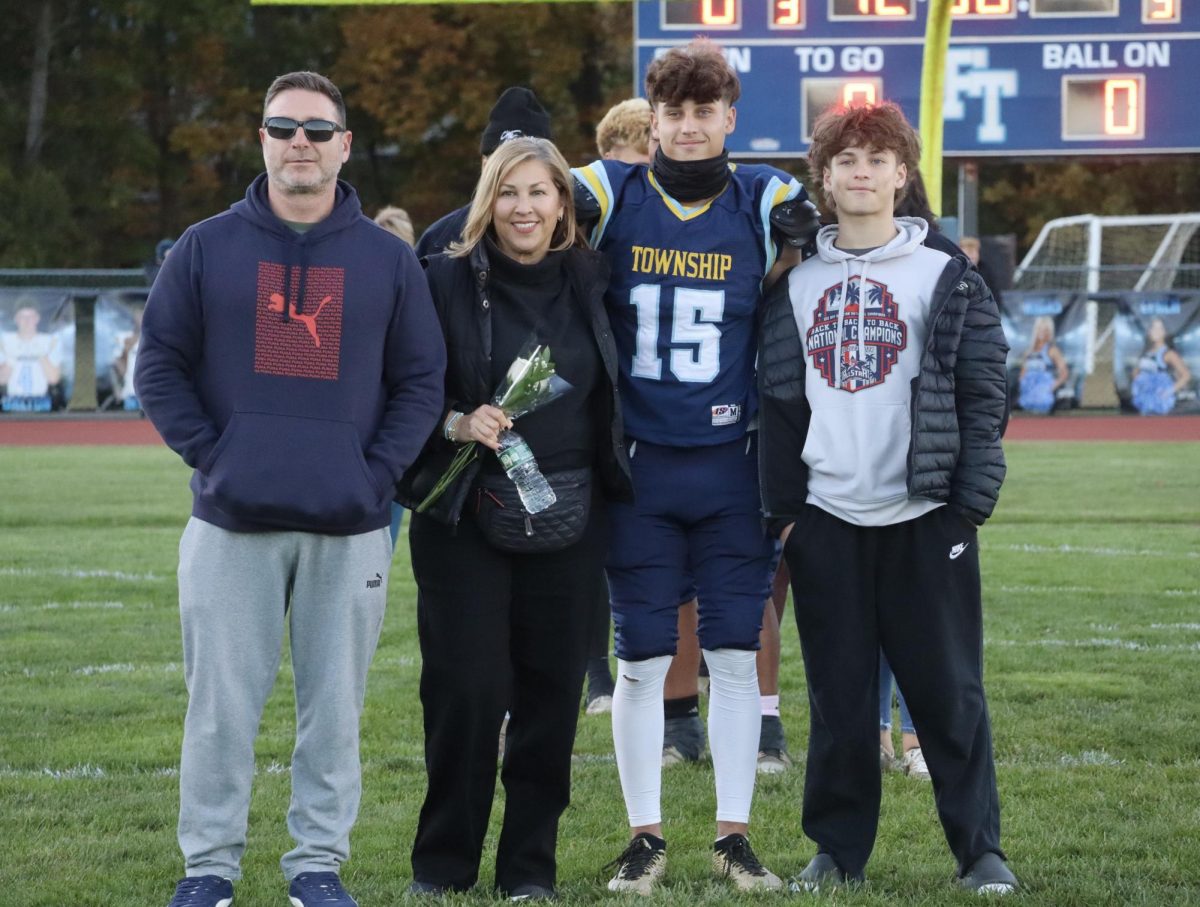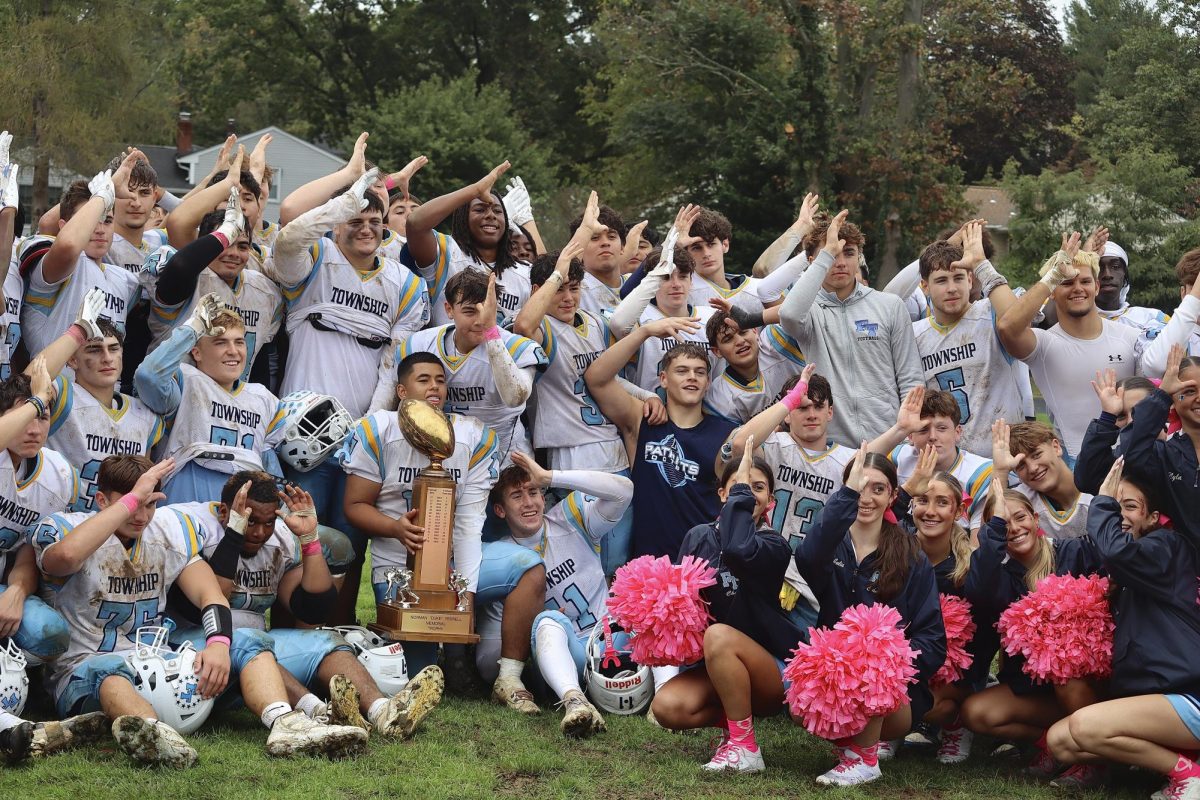Emily’s Weekly Political Scoop: The Omicron Variant and Sarah McBride
December 1, 2021
I hope each and every one of you had a wonderful Thanksgiving break! Let’s jump right into what you came for, shall we?
The Omicron Variant: For the past 5 days, the news and media has been filled with everything Omicron Variant, the new COVID-19 variant that was discovered by the World Health Organization (WHO) on November 26th. WHO details all that is known about the variant, and the CDC clarifies that the variant was first reported in South Africa (“Coronavirus Disease 2019”).
According to WHO, researchers in South Africa and globally are continuously finding out new information about the variant through studies, so keep in mind that the following information could very well change. Currently, the question of whether it is more transmissible is unknown and though there is an increasingly high number of positive COVID-19 cases in areas of South Africa, who have been severely hit by this variant, it is not certain whether it is solely due to Omicron or if other factors are to blame (“Update on Omicron”).
However, NPR states that based on “red flags,” researchers believe it may be the most infectious out of all the variants we know of. Currently, it has surpassed current data as it has spread to at least seven of South Africa’s nine provinces in the past two weeks and may have caused the country to experience its recent outbreak. As previously mentioned, however, their data is limited and it cannot be 100% certain that is the variants cause for the influx in cases (Doucleff).
Researchers still have reason to believe it has the highest transmissibility proven by certain mutations in the variant. It carries mutations that help with evading the immune system and though some exist in other variants, there are multiple in Omicron. I’ll try my best not to bore with the science, but it is predicted that it will significantly resist antibodies in those who already have the virus or have mRNA vaccines, the technology used by the Pfizer and Moderna vaccines. However, it is also predicted that getting three doses of the vaccine or two doses of a natural infection will make antibodies strengthened enough to block the variants (Doucleff). Solid information about the effectiveness of the vaccine to this variant is not known, and the vaccines are proven to still be vital in decreasing severe disease and death and are effective against the Delta variant (“Update on Omicron”).
WHO states that the severity of the disease in comparison to other variants is unknown and though hospitalization in South Africa has increased, it may be due to the amount of people admitted into the medical facilities rather than the magnitude of the virus itself. They do know through limited preliminary evidence, however, that there may be an increase in reinfection. The effectiveness of current tests seem to continue to be accurate and current treatments like corticosteroids and IL6 Receptor Blockers will continue to be utilized in managing severe COVID-19 patients (“Update on Omicron”).
Though many of the aspects of the Omicron variant remains unknown, WHO recommends actions that people can take to decrease the likelihood of being infected and transmitting the disease, including staying 1 metre from other, wearing a mask, opening windows, avoiding crowded spaces, effectively cleaning your hands, and getting the vaccine if one of able to (“Update on Omicron”).
Immerse Into the Diverse: Today, the transgender community faces hostility, discrimination, and insufficient protection by the federal government. To capture how dire of an issue this truly is, Howard University concluded that 1.4 million adults identify as trasngender in the U.S., and keep in mind that is not counting transgender youth (“HUSL Library: A Brief History of Civil Rights in the United States: Transgender Rights in the United States”). When you think about it, it is crazy to think that such a large group of people experience hatred, violence, unequal opportunities, and social disparities in comparison to cisgender people in the modern day. Taking all of this into account, you can see as to why I am highlighting Senator Sarah McBride of Delaware, the first transgender state Senator and America’s highest-ranking transgender elected official in history.
The National Women’s History Museum details McBride’s early life and her rise to politics, crucially starting with the fact she was born on August 9, 1990 in Delaware to mother Sally and father David. Her interest in government and politics sparked at a young age and her first campaign volunteer opportunity occurred when she was 14, and she led the Delaware chapter of Young Democrats at 17. The next year, she worked on Jack Markell’s campaign for governor, which he won, and two years later, served as Beau Biden’s driver and aide when he ran for Delaware attorney general (“Sarah McBride”).
Even though she achieved honorable roles and defied history at a young age, she still ran for student body president at American University in 2011, at the time, presenting herself as a cisgender, heterosexual man. Her campaign was successful and helped solidify her love for leadership in politics but after having hidden her identity and who she really was for so long, she came out to her family and close friends that year, and she published an editorial in the student newspaper announcing she was transgender at the end of her presidential term in 2012 (“Sarah McBride”). Breaking history later in the year, NBC states that she interned at the White House that made her the first transgender woman to ever work in the building (Avery).
Although itching to return back to Delaware, McBride knew that the state offered no protection against gender identity discrimination, meaning she was at risk of being fired, denied housing, and could legally be refused service at restaurants. Fueled by the severity to fight for her community, McBride contacted Governor of Delaware Jack Markel and proposed a law focused on the problem, which he backed. Through her senior year of college, she persuaded the Delaware state legislature to support her bill, constantly met with legislators advocating for it, and shared personal stories when opponents of the bill were hostile and threatening. Though frighteningly close, the bill was passed in 2013 and McBridge received the highest honor the Governor of Delaware can award, the Order of the First State (“Sarah McBride”).
Her time spent in the White House was not only politically important to the young woman but relationship-wise as well, the Speaker’s Bureau of Penguin Random House detailing her relationship with Andrew Cray, a transgender man and LGBTQ+ advocate. As they fought side-by-side for LGBTQ+ equality, the two fell deeply in love. Unfortunately, Andrew was diagnosed with terminal cancer and passed away days after their wedding, but he lives on in McBride’s continuance fight for political and social change (“Sarah McBride” Penguin Random House Speakers Bureau). In fact, his death ignited a bigger sense of urgency within McBride to fight for such rights as she was irate that Andrew was not able to truly be himself for a longer duration in his short life due to prejudice (“Sarah McBride”).
Her career continued to blossom and she became the national press secretary for Human Rights Campaign, America’s largest LGBTQ+ civil rights organization, making her an incredibly influential figure in the fight for various sexual orientations and gender identities to gain rights. Uplifted by her position, she gave an address to the American public during the 2016 presidential election in support of Hilary Clinton, making her the first openly transgender person to address a national party convention (“Sarah McBride”).
If you thought she forgot about her home state, then you are incredibly mistaken. In Delaware, she focused on expanding Medicaid and passing legislation that would be protect at-risk youth from child abuse, sharing her experiences as a sexual assault survivor and explaining the sexual violence transgender people face during the height of the #MeToo movement in 2017 (“Sarah McBride”). She then went on to write a memoir titled Tomorrow Will Be Different that detailed her journey and experiences as a transgender woman, sharing everything from coming out to advocacy to love and loss (“Sarah McBride” Penguin Random House Speakers Bureau).
You may be thinking, “This woman has achieved numerous, incredible feats that many can only dream of, breaking historical social barriers at such a young age. What more can there be?” So. Much. More. In 2019, she announced her bid for Delaware state senate on the basis of the values she has advocated for for so many years (“Sarah McBride” Penguin Random House Speakers Bureau). The district she ran for in 2020 extended from northern Wilmington to the Pennsylvania border, winning the election and becoming a state Senator on November 2, 2020. Through this victory, she officially became America’s highest-ranking, openly transgender elected offical, stating, “It is my hope that a young LGBTQ kid here in Delaware or really anywhere in this country can look a the results and know that our democracy is big enough for them, too” (“Sarah McBride”).
However, it is important to note that she was never running as Senator based on her identity, stating, “I said from the first day of my campaign that I wasn’t running to be the ‘trans’ senator. I wanted to do right by the transgender community, but the way to do that was to be the best state senator I could. I was running to be the health care senator and the paid-leave senator. Those were the issues rooted with my constituents” (Avery).
Sarah McBride’s influence on the LGBTQ+ community and her historical significance to breaking barriers has forever changed the political power that transgender individuals can hold, inspiring entire generations of people. McBride’s successes throughout her life and her ultimate achievement of becoming a Delaware Senator showcases the tireless fight that many must endure in order to fulfill their dreams. And clearly, McBride’s career, advocation, and influence is far from over.
Works Cited
Avery, Dan. “Sarah McBride Wasn’t Running to Be the ‘trans’ State Senator. But She Became
the 1st.” NBC News, 01 June 2021,
www.nbcnews.com/feature/nbc-out/sarah-mcbride-wasn-t-running-be-trans-state-senator
she-n1269119.
“Coronavirus Disease 2019.” Centers for Disease Control and Prevention, 26 Nov. 2021,
www.cdc.gov/media/releases/2021/s1126-B11-529-omicron.html.
Doucleff, Michaeleen. “Why Some Researchers Think the Omicron Variant Could Be the Most
Infectious One Yet.” NPR, 30 Nov. 2021,
www.npr.org/sections/goatsandsoda/2021/11/30/1059859253/why-omicron-variant-sprea
d-so-quickly-infectious-mutations.
“HUSL Library: A Brief History of Civil Rights in the United States: Transgender Rights in the
United States.” Howard University, library.law.howard.edu/civilrightshistory/transgender.
“Sarah McBride.” National Women’s History Museum,
www.womenshistory.org/education-resources/biographies/sarah-mcbride.
“Sarah McBride.” Penguin Random House Speakers Bureau, 11 Oct. 2021,
www.prhspeakers.com/speaker/sarah-mcbride.
“Update on Omicron.” World Health Organization, 28 Nov. 2021,
www.who.int/news/item/28-11-2021-update-on-omicron.















































